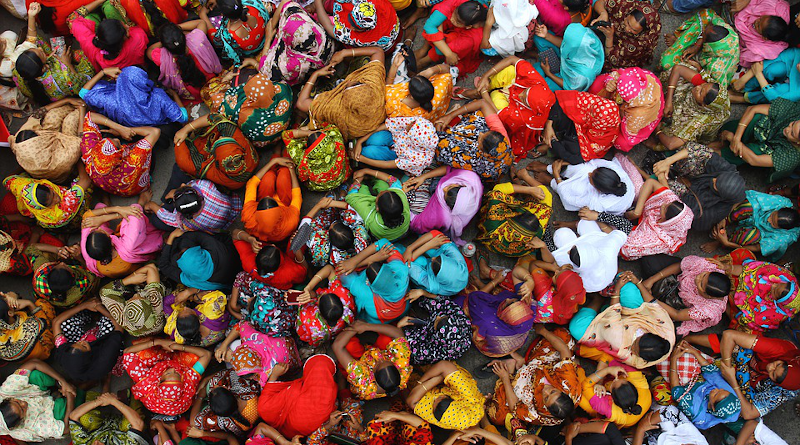Violence Against Women – OpEd
There are multiple definitions of violence against women as the United Nations defines “any act of gender-based violence that results in, or is likely to result in, physical, sexual, or mental harm or sufferings to women, including threats of such acts, coercion or arbitrary deprivation of liberty, whether occurring in public or private life”. A 2018 analysis of prevalence data from 2000-2018 across 161 countries and areas, conducted by WHO on behalf of the U.N. Interagency working group on violence against women, found that worldwide, nearly 1 in 3, or 30%, of women have been subjected to physical and/or sexual violence by an intimate partner or non-partner sexual violence or both. Nearly 1 in 3 women have been abused in their lifetime.
In times of crisis, the numbers rise, as seen during the COVID-19 pandemic and recent humanitarian crises, conflicts, and climate disasters. A new report from U.N. Women, based on data from 13 countries since the pandemic, shows that 2 in 3 women reported that they or a woman they know experienced violence and are more likely to face food insecurity. Only 1 in 10 women said that victims would go to the police for help. Hence, physical, sexual, and psychological violence against women causes women’s severe short and long-term physical, mental, sexual, and reproductive health problems. Similarly, such violence has severe impacts on social and economic costs for women, their families and societies.
Women have suffered a great deal at the hands of males over the years. They were handled as if they did not exist in previous ages. Even though historically, most of the rights, such as the right to vote, belonged to men. There are many countries like Pakistan where the status of women is not equal due to gender inequality in multiple fields. For instance, rural/urban divide, irregular socioeconomic growth, feudal system, male-dominated society, and influence of ethnic, old fashioned and capitalist social norms on woman’s lives. Resultantly, Pakistani women are dependent on male members due to their low social, economic and political position. Generally, women worldwide face multiple problems such as violence against their self-respect and dignity, rape and honour killing, Women trafficking and cultural and societal pressures. However, in third-world countries like Afghanistan, Pakistan, and India, women suffer a lot at the hands of their male counterparts. Even in educated and urban households in such countries, many women are denied a voice in their health, education, and marriage choices.
With time and the spread of awareness among masses worldwide, women became more conscious of their fundamental rights. The revolution for women’s empowerment began there. In this regard, on March 8 every year, women worldwide gather and celebrate International Women’s Day (IWD) to acknowledge women’s social, economic, cultural, and political contributions. Furthermore, raising awareness about problems like gender equality, reproductive rights, violence, and abuse against women is also a pivotal point in the women’s rights movement. Women empowerment refers to giving women the power to make decisions for themselves. Women’s emancipation came as a breath of fresh air because they could not make decisions. It made them aware of their rights and how they must forge their path to achieve their name, fame, and value worldwide rather than relying on men.
The world has become a global village where everyone is interlinked with one another through social media and other latest and modern forms of communication. Because of this, many nations, such as countries from the American and European continents, have given more rights to women than the Asian and African continents. However, if one looks at the history of former continents where women enjoyed more rights and independence than later, women were also deprived of their fundamental rights. There is a long history of women’s struggle on these continents. They fought for rights and independence and achieved their fundamental rights after many years of effort, hardships, and vulnerabilities. The continents where women still are deprived of their fundamental rights need the spread of awareness and education. Women of such continents must raise their voices against injustices and violence against them.
Why don’t people look at their mindsets and behaviours on this and see what they can do as individuals to combat the injustice, discrimination, and bigotry against women? Why don’t they start from their homes? Let them look at their behaviour toward other females in the family; if they are women, the males should ask themselves if they are treating their mothers, sisters, daughters, and wives the right way? It can only be achieved through changing our mindset, behaviour, and thinking regarding the female portion of our society. In 2019, WHO and U.N. Women, with endorsement from 12 other U.N. and bilateral agencies, published RESPECT women – a framework for preventing violence against women aimed at policymakers. Another future without violence against women is possible with education, essential services across policing, justice, health, and social sectors, and sufficient financing dedicated to women’s rights.
The writer has done an M.Phil. in Zoology from Quaid-i-Azam University Islamabad, Pakistan.

